iHeartDogs is reader-supported. When you buy via links on our site, we may earn an affiliate commission at no extra cost to you.
Dog vaccines are a crucial part of ensuring the long-term health and well-being of our four-legged friends. Just like humans, dogs need vaccinations to protect them from various diseases, some of which can be life-threatening. But with so many vaccines available, it can be overwhelming for dog parents to understand which dog vaccines are absolutely necessary, when to schedule them, and how much they cost.
Navigating the world of canine vaccinations can be daunting for any pet parent, but we’re here to help by answering your questions about dogs and their all-important shots. From explaining their purpose to possible side effects, find all the information you need and more.
What Vaccinations Do Dogs Need?
Core Vaccines for Dogs
So, which dog vaccines are absolutely necessary? The American Animal Hospital Association recommends that dogs receive core vaccines for rabies, distemper, parvovirus, and adenovirus (hepatitis). These core vaccinations protect against the most common and severe diseases. Here’s more about each of these important dog vaccines:
Rabies Vaccine:
-
- What it Protects Against: Rabies is a deadly virus that affects the brain and spinal cord of all mammals, including dogs and humans. It’s typically transmitted through the bite of a rabid animal. The virus is almost always fatal once symptoms appear.
- Importance: The rabies vaccine is legally required in many areas due to the severity of the disease and its risk to humans. Vaccinating dogs against rabies is crucial for public health as well as the safety of the pet.
When it comes to the importance of vaccinating your dog against rabies, Dr. Kathryn Primm, the owner and operating veterinarian of Applebrook Animal Hospital in Ooltewah, TN, explains, “Rabies vaccination is extremely effective, making the disease 100% preventable, so based on efficacy coupled with the severity and fatality of the disease itself, the idea of vaccinating dogs is a great one.”
RELATED: Do Dogs Still Need the Rabies Vaccine?
Distemper Vaccine:
-
- What it Protects Against: Canine distemper is a viral disease that affects the respiratory, gastrointestinal, and nervous systems of dogs. It’s highly contagious and often fatal, especially in puppies and older dogs. The virus can also affect wild animals like foxes, raccoons, and skunks.
- Importance: There’s no cure for distemper, so prevention through vaccination is key. The disease can cause severe symptoms, including fever, nasal discharge, coughing, lethargy, loss of appetite, and more serious neurological symptoms.
Parvovirus Vaccine:
-
- What it Protects Against: Canine parvovirus is a highly contagious viral illness primarily affecting puppies. The virus manifests in two different forms: the more common intestinal form, which is characterized by vomiting, diarrhea, weight loss, and lack of appetite; and the cardiac form, which attacks the heart muscles of very young puppies, often leading to death.
- Importance: Parvovirus is particularly dangerous because it’s highly contagious and can survive in the environment for long periods. Vaccination is essential to protect puppies, who are most at risk and can quickly become critically ill from this virus.
Adenovirus (Hepatitis) Vaccine:
-
- What it Protects Against: This vaccine protects against canine adenovirus type 1 and type 2. Type 1 causes infectious canine hepatitis, a disease that affects the liver, kidneys, spleen, lungs, and eyes. Type 2 is associated with respiratory infections and is one of the causes of canine infectious tracheobronchitis, also known as kennel cough.
- Importance: While canine hepatitis is less common than it used to be, thanks to widespread vaccination, it can still be a serious illness. Adenovirus type 2 is more prevalent and contributes to respiratory disease in dogs. Vaccination helps prevent both forms of the virus.
Each of these vaccines plays a crucial role in safeguarding dogs from these serious diseases, helping to ensure a long, healthy life for our canine companions. Dog parents should work with their veterinarians to maintain an appropriate vaccination schedule. See more about vaccination schedules below.
Non-Core Vaccines for Dogs
It’s vital to understand not only the essential core vaccinations but also the importance of non-core vaccines in safeguarding our furry companions against a range of specific health threats. Non-core vaccines are tailored to the individual dog’s lifestyle, environment, and exposure risks. They protect against diseases that, while not universally threatening to all dogs, can pose significant risks in certain situations. These are the typical non-core vaccines dogs receive:
Bordetella Vaccine:
-
- What it Protects Against: This vaccine guards against Bordetella bronchiseptica, a key agent of kennel cough, a highly contagious respiratory disease common in dogs. A harsh, hacking cough characterizes kennel cough and can lead to more severe complications, especially in puppies and older dogs.
- Importance: Recommended for dogs that frequent boarding facilities, dog parks, grooming salons, or any place where they’re in close contact with other dogs. This vaccine helps reduce the risk of contracting this easily spread respiratory ailment.
RELATED: 7 Things Every Dog Parent Should Know About Kennel Cough
Borrelia Burgdorferi (Lyme Disease) Vaccine:
-
- What it Protects Against: This vaccine protects against Lyme disease, a tick-borne illness caused by the Borrelia burgdorferi bacteria. Symptoms in dogs include fever, lameness, swollen joints, and lethargy. In severe cases, it can lead to kidney problems.
- Importance: Particularly important in areas where Lyme disease is prevalent, such as the northeastern and upper midwestern United States. Dogs that spend much time in wooded or grassy areas, where ticks are common, should be considered for this vaccine.
Leptospira Vaccine:
-
- What it Protects Against: Leptospirosis is caused by the Leptospira bacteria. It can lead to severe kidney and liver damage in dogs and can be transmitted to humans. Symptoms include fever, vomiting, abdominal pain, diarrhea, and jaundice.
- Importance: Recommended for dogs that are exposed to wildlife, live in or travel to areas with high rainfall and standing water, or have access to ponds, lakes, or streams. Vaccination can prevent this potentially serious zoonotic disease.
Canine Influenza Vaccine:
-
- What it Protects Against: This vaccine protects against canine influenza, a respiratory infection caused by specific influenza viruses known to infect dogs. Symptoms are similar to kennel cough but can be more severe and lead to pneumonia.
- Importance: Especially recommended for dogs regularly exposed to other dogs in kennels, doggy daycares, or dog shows. The vaccine can help prevent or reduce the severity of canine influenza.
Crotalus Atrox Toxoid (Rattlesnake Vaccine):
-
- What it Protects Against: Also called the rattlesnake vaccine or rattlesnake shot for dogs, this vaccine is specifically designed to protect dogs from the venom of the Western Diamondback Rattlesnake (Crotalus atrox). While not completely preventative, it can reduce the severity of symptoms and the amount of antivenom needed if a dog is bitten.
- Importance: Particularly recommended for dogs living or frequently walking in areas where these rattlesnakes are common. It provides an added layer of protection against these dangerous snake bites.
Each of these non-core vaccines addresses specific risks that may not apply to all dogs but are crucial for those in certain environments or with particular lifestyles. As always, discuss which vaccines are appropriate for your dog with your veterinarian based on their risk factors and lifestyle.
What is the 7-in-1 vaccine for dogs?
The 7-in-1 vaccine, often referred to as a “multivalent vaccine,” is an innovative and comprehensive solution that takes the top three vaccines for dogs plus others and combines them into one
in the world of canine healthcare. This single injection is designed to safeguard our furry companions against a spectrum of diseases, streamlining the vaccination process and enhancing overall protection. At its core, the 7-in-1 vaccine addresses several critical illnesses that pose significant threats to dogs. These include:
- Canine Distemper
- Hepatitis
- Leptospirosis
- Parvovirus
In addition to these core diseases, the 7-in-1 vaccine may also protect against other ailments, such as parainfluenza and coronavirus, depending on the specific formulation. These additional components enhance the vaccine’s protective scope, offering broader defense against common viral challenges in the canine world.
The convenience of the 7-in-1 vaccine lies in its ability to deliver extensive protection with a single injection. This not only reduces stress for the dog but also simplifies the vaccination schedule for pet parents. Plus, it ensures that dogs don’t miss out on critical vaccines due to oversight or scheduling difficulties.
And remember, while the 7-in-1 vaccine covers many bases, it may not include all necessary vaccinations for every dog. Rabies, for example, is typically administered separately due to legal requirements and vaccine formulation.
Do Dogs Really Need All These Vaccines?
The answer is, it depends. While core vaccines are recommended for all dogs, some non-core vaccines may be optional based on your dog’s lifestyle and risk factors. Your vet can provide guidance on which vaccines are necessary for your dog. To learn more about the necessity of vaccination and determining factors, check out Annual Vaccines for Dogs – Are They Really Necessary?
Dog Vaccines Schedule: Timing is Key
At what age do dogs need shots, and which shots do puppies need? Puppies typically start their dog vaccine schedule around 6-8 weeks of age as the maternal antibodies they receive at birth begin to wane, leaving them susceptible to various diseases. The initial vaccines given to puppies include core vaccines like distemper, parvovirus, and adenovirus, as well as non-core vaccines, depending on their environmental exposure risks. Booster shots, administered every 3-4 weeks until they reach about 16 weeks old, are essential in building and solidifying their immunity.
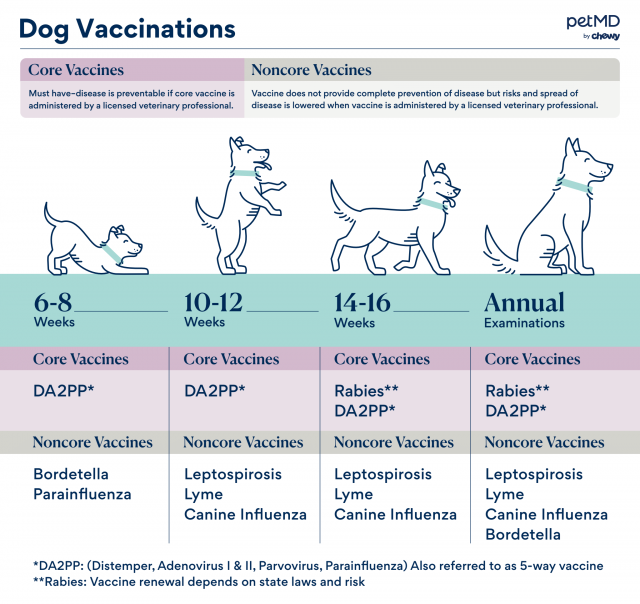
As puppies grow into adulthood, their vaccination needs evolve, and these adult dog vaccines are essential, too. It’s a common misconception that adult dogs don’t need regular vaccinations. In reality, maintaining their immunity is a vital aspect of their health regimen.
Adult dogs generally require booster vaccinations to maintain their immunity against critical diseases. While the core vaccines like rabies may be administered every three years, the schedule can vary based on local regulations and the specific vaccine used. This variation underscores the importance of regular veterinary consultations to tailor a vaccination schedule that aligns with your dog’s health needs, lifestyle, and age. And if stress plagues your pup when it’s time for that annual visit, there are some things you can try to help them keep on the calmer side.
Reducing Stress at the Vet
Gradually familiarize your dog with the environment and the people at the veterinary clinic. Short, positive visits that don’t involve treatments can help build positive associations. And while at home, train your dog to be comfortable with being handled and touched. Positive reinforcement training can be incredibly effective.
Bring a favorite toy or blanket to give your dog a sense of security and comfort in the clinic. Practice calming techniques like gentle petting or using a soothing voice to reassure your dog. Consider using products that reduce anxiety, such as calming collars or calming chews, like iHeartDogs Hemp Calming Chews for Dogs. And don’t forget to stay calm. Dogs often mirror their owner’s emotions. Remaining tranquil and positive yourself can significantly impact your dog’s behavior. By implementing these strategies, you can help make your dog’s veterinary visits and vaccination experiences as stress-free as possible.
RELATED: The 10 Best Calming Supplements for Dogs
How Do Vaccines Work?
Let’s get scientific for a second and talk about how dog vaccines work. Simply said, vaccines train a dog’s immune system to recognize and combat specific diseases without exposing the animal to the full brunt of the disease. When dogs receive a vaccine, they’re introduced to a small, harmless part of the virus or bacteria, or a weakened version of the pathogen.
This introduction doesn’t cause the disease itself, but it’s enough to stimulate the dog’s immune system. The immune system responds by producing antibodies, which are proteins that specifically recognize and bind to the pathogen. This response is the body’s rehearsal for a real infection.
Think of it this way: the immune system has a kind of memory. Once it has responded to a specific pathogen, it ‘remembers’ it. If your dog is ever exposed to the actual disease in the future, the immune system can recognize it quickly and mount an effective defense. This response is usually swift and potent enough to prevent the disease from developing or makes it much less severe.
Booster shots, given at intervals after the initial vaccination, are crucial in this process. They remind the immune system about the pathogen, reinforcing the immune response and ensuring long-lasting protection. This safe exposure prepares the dog’s immune system to fight off actual infections more effectively in the future. It’s a proactive approach that has saved countless canine lives and is a cornerstone of preventive veterinary care. By keeping dogs healthy, vaccines also protect the wider community by reducing the spread of infectious diseases.
Can Pets Have Adverse Reactions to Vaccines?
Vaccinations are a fundamental part of keeping our dogs healthy, but like any medical treatment, they can come with side effects and adverse reactions. Though vaccine issues are rare, understanding the potential reactions can help dog parents make informed decisions and take appropriate actions if needed.
As noted by Dr. Primm, the risk of adverse reactions to vaccines is relatively low compared to the risk of contracting preventable diseases.
Dr. Primm emphasizes, “More pets die from preventable diseases than have problems with their vaccines, and certainly in the case of rabies, there is human health significance as well.”
Most reactions to vaccines are minor and short-lived. Common side effects include soreness at the injection site, mild fever, lethargy, and reduced appetite. These symptoms typically resolve within a day or two without any need for treatment. To help your pup feel better, tuck them into their Best Friends By Sheri Dog Bed to give them sweet, healing dreams.
However, in rare cases, dogs can experience more severe allergic reactions. Symptoms of a serious reaction can include persistent vomiting, diarrhea, swelling of the face or limbs, difficulty breathing, or collapse. These symptoms usually occur within minutes to hours after vaccination and require immediate veterinary attention.
To minimize the risk of adverse reactions, Dr. Primm advises, “You need to make sure that your dog is vaccinated with the highest quality, filtered vaccines from a well-known manufacturer to minimize the chance of any kind of allergic reaction. Most reactions are caused by the ingredients included in the injection and not the active ingredient itself.”
Always monitor your dog after vaccination and consult your veterinarian if you observe any unusual symptoms. Remember, the benefits of vaccinations in preventing serious diseases far outweigh the relatively small risk of adverse reactions.
Can Vaccines Cause Tumors in Dogs?
The concern about vaccines causing tumors in dogs is a topic that has garnered attention among pet parents. And while the possibility exists, it’s important to understand the context and rarity of such occurrences.
Tumors associated with vaccines in dogs are known as vaccine-associated sarcomas (VAS). These are rare but serious occurrences that can develop at the site of a vaccine injection. Research suggests these tumors are more likely to be associated with certain types of vaccines, particularly those containing adjuvants, substances that enhance the body’s immune response to the vaccine. However, it’s important to note that the incidence rate of VAS is extremely low. The American Veterinary Medical Association (AVMA) estimates that these sarcomas occur at a rate of approximately 1 in 10,000 to 1 in 30,000 vaccinated cats, with the frequency in dogs being even lower.
The exact cause of vaccine-associated sarcomas is not fully understood, but it’s believed to involve a complex interaction between the vaccine components and the dog’s immune system. It’s thought that, in very rare cases, this interaction can lead to abnormal cell growth and tumor formation. Dog parents must weigh the very low risk of VAS against the high risk of the potentially deadly diseases that vaccines prevent. Vaccinations have saved countless canine lives, protecting against serious illnesses like rabies, distemper, and parvovirus.
Veterinarians consider this risk and follow guidelines to minimize it, including using vaccines without adjuvants when available and appropriate, rotating injection sites, and keeping detailed records of vaccination sites and types.
RELATED: Hot Debate: Vaccine Causing Tumors in Dogs? – How High’s the Risk?
How Much Protection Do Dog Vaccines Provide?
The level of protection provided by vaccines depends on several factors, including the type of vaccine, the disease it’s designed to prevent, and the individual dog’s response to the vaccine.
Core vaccines, such as those for rabies, distemper, parvovirus, and adenovirus, are generally very effective. For instance:
- Rabies Vaccine: Highly effective and often required by law, this vaccine provides almost complete protection against the rabies virus.
- Distemper, Parvovirus, and Adenovirus Vaccines: These vaccines are also highly effective in preventing these severe diseases, with efficacy rates often exceeding 90%.
Non-core vaccines, like those for Bordetella, Lyme disease, and leptospirosis, offer variable levels of protection depending on environmental exposure and individual risk factors.
Factors Influencing Vaccine Efficacy
- Age and Health of the Dog: Puppies and older dogs with weaker immune systems may not respond to vaccines as robustly as healthy adult dogs.
- Vaccination Schedule Compliance: Adhering to the recommended vaccination schedule ensures maximum protection.
- Vaccine Storage and Administration: Proper handling and administration of vaccines play a significant role in their effectiveness.
Duration of Protection
Most core vaccines provide protection for several years, though booster shots are necessary to maintain immunity. The duration of immunity varies based on the vaccine type and your dog’s immune response. And while vaccines significantly reduce disease risk, no vaccine is 100% effective. Breakthrough infections can occur, especially in areas with high disease prevalence or in dogs with weakened immune systems.
And when thinking about protecting your dog, don’t forget to protect them from parasites like fleas and ticks. That’s another vital part of maintaining your dog’s health. Learn How To Spot And Treat Fleas, Ticks, And Lice for your dog’s health and comfort.
Cost Matters: Affordable Options for Dog Vaccinations
The cost of puppy vaccines and adult dog vaccines can vary widely depending on your location, the clinic you choose, and the types of vaccines needed. Generally, the highest costs for dog vaccinations are incurred in the first year of a puppy’s life when repeated doses are needed, and totals can range from about $100 to over $200.
After the initial puppy vaccinations, the annual cost for routine vaccinations typically ranges between $80 and $250. This includes booster shots, which may be needed for certain vaccines. The specific vaccinations your dog requires will depend on various factors, including age, health, lifestyle, and the prevalence of certain diseases in your region. For example, if you live in an area prone to ticks, your veterinarian may recommend additional vaccinations or medications to prevent tick-borne diseases.
It’s important to note that the cost of vaccinations can also include additional veterinary services like health checkups. Pet insurance might be a worthwhile investment to consider, as it can help cover some of these costs. There are often low-cost vaccination clinics available, so it’s worth doing a little research to find affordable options near you. As always, it’s best to consult your veterinarian to create a vaccination schedule and budget tailored to your family’s needs.
RELATED: Pet Insurance: Here’s What Every Dog Owner Should Know
The Bottom Line: Protecting Your Dog’s Health
Vaccinations play a vital role in preventing serious diseases in dogs. But your dog’s safety is paramount; when searching for ‘dog vaccines near me,’ don’t just choose the first place that pops up. Do your research and choose a reputable clinic that values your dog’s well-being as much as you do. Staying informed and keeping up with your dog’s vaccination schedule is one of the best ways to ensure their health and happiness for years to come.
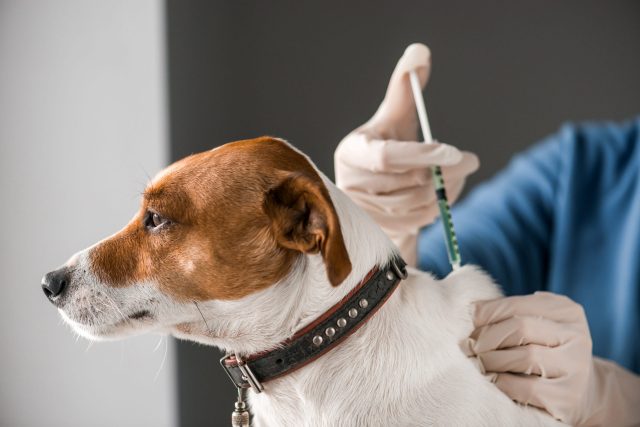
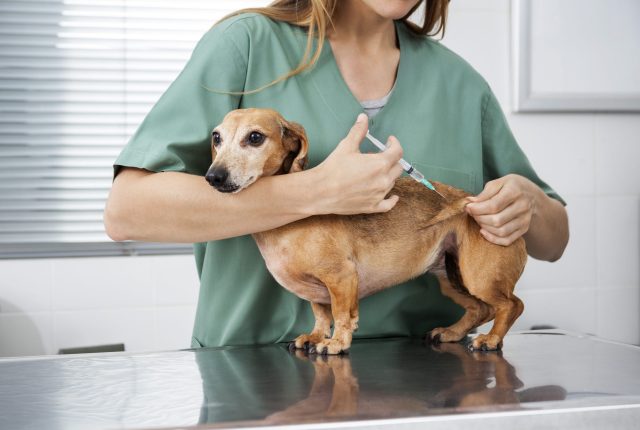
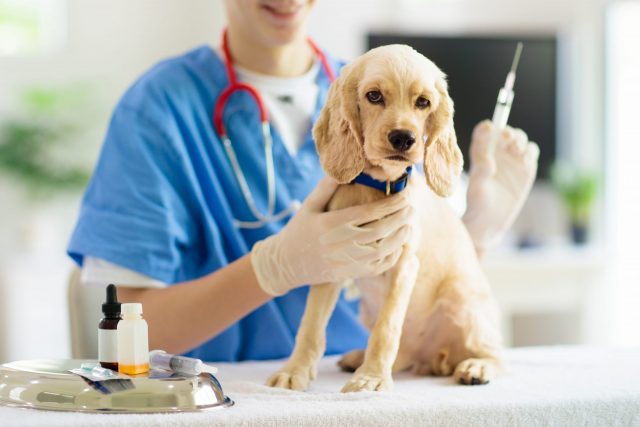


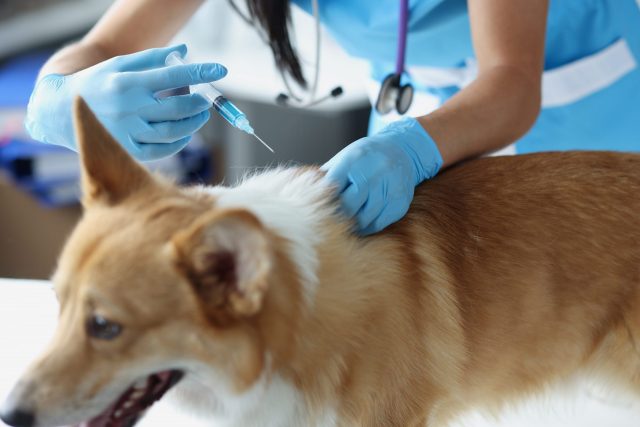
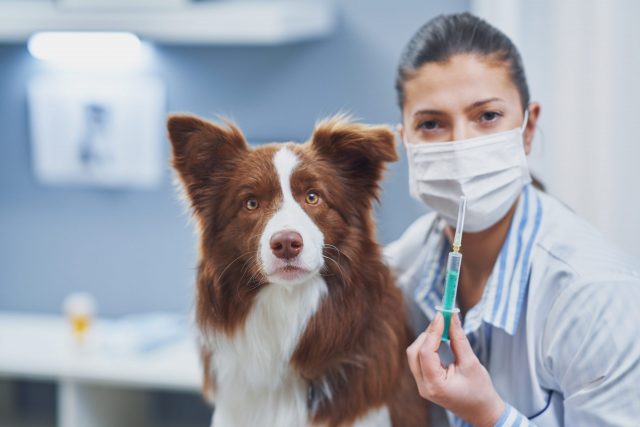
 Toledo, United States.
Toledo, United States.